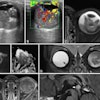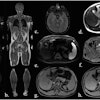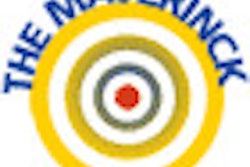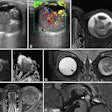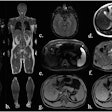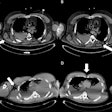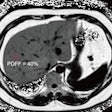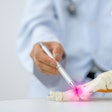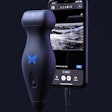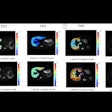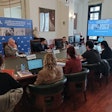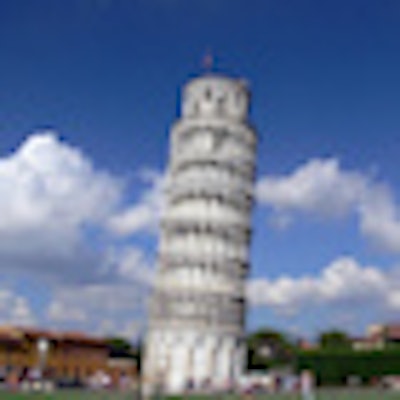
For the first time in its 27-year history, the Computer Assisted Radiology and Surgery (CARS) congress will take place in Pisa. Next month, delegates will descend on the relatively small Italian city for four days of multidisciplinary exchange.
Although globally more renowned for its leaning tower, Pisa also has a prominent reputation among the scientific community for technological clout: One reason is that its 90,000 population is bolstered by an extra 50,000 students at the university, a portion of whom remain in the area after completion of their doctorates to start up innovative biomedical companies, according to Dr. Davide Caramella, head of radiology at Santa Chiara Hospital, Pisa, and president of this year's CARS meeting.
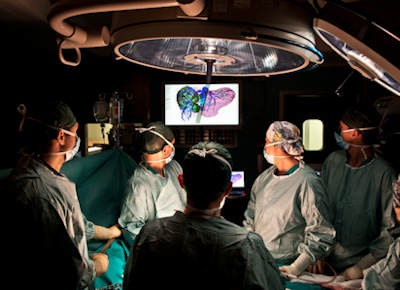 Surgeons analyze a segmented 3D CT dataset during a hepatic resection. Photo by Enzo Cei. All images courtesy of Dr. Davide Caramella.
Surgeons analyze a segmented 3D CT dataset during a hepatic resection. Photo by Enzo Cei. All images courtesy of Dr. Davide Caramella."Pisa is an excellent environment for research and therefore a perfect host for CARS," he noted. "This year's CARS will be a truly multidisciplinary forum embracing surgeons, radiologists, and technicians for imaging and surgical IT exchange. Academic radiologists from around the world will be inspired by new ideas."
Between 27 and 30 June, delegates from around the world will learn about the latest developments in surgical robotics, advanced image processing, computer-aided diagnosis (CAD), and PACS, just a few of the many themes to be covered in this year's comprehensive program. Specifically, CARS founder Dr. Hans Lemke, PhD, will be presenting a lecture on the role of computer-assisted radiology and surgery in personalized medicine. This year's congress is also included in the bioengineering week due to start in Rome on 24 June before moving to Pisa.
Wednesday's clinical focus targets technologists, engineers, and scientists, to give them a direct impression of how their tools impact clinicians and patients. The day will cover interventional radiology, interventional oncology, and computer-assisted treatments for prostate and spine, including minimally invasive spinal surgery.
This will be followed on the Thursday by EuroPACS, an entire day devoted to themes such as regional systems, teleradiology, e-learning, and how to include radiation dose information into PACS, an issue that is steadily growing in importance among PACS users. In the afternoon, sessions will be purely research-orientated and will focus on collaborative projects and Integrating the Healthcare Enterprise (IHE).
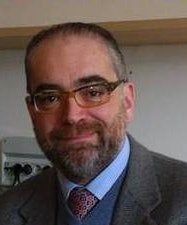 Dr. Davide Caramella believes that Italy must strive to close gap between research and clinical applications.
Dr. Davide Caramella believes that Italy must strive to close gap between research and clinical applications.
The choice of Turkey as this year's country focus at CARS is down largely to the input of the Mediterranean Institute of CARS founded in 2008 to promote computer-assisted radiology and surgery in southern European and Mediterranean countries. Specialists from Ankara and Antalya will discuss Turkey's vibrant and innovative radiological community and present the country's latest projects, according to Caramella.
It is hoped also that delegates will find the time to learn about computer-assisted imaging developments taking place within Pisa itself.
Since 2003 when the radiology and surgical departments at Santa Chiara created the ENDOCAS unit, preoperative imaging and robotics have aided in computer-assisted endoscopic surgery.
"By using image processing and navigation systems, ENDOCAS provides support to surgeons. Reconstructions and simulations are included in the surgeons' planning before they go into the operating room in around three or four interventions per month in Pisa," Caramella said. "For example, estimates of liver remnant will tell the surgeon whether or not the patient will be able to lead a healthy life after surgery. In addition, intraoperative navigation aids are developed for traditional, laparoscopic, and endovascular interventions."
Pisa, along with Milan and Rome, has a strong reputation for applying innovative techniques in the clinical setting: Robotic pancreas transplantation, first performed at the University Hospital of Pisa in Italy by surgeon Dr. Ugo Boggi, being a case in point.
"However, although Italy is doing well academically, there is work to be done to bridge the gap between research and implementation outside of these main centers," Caramella said.
In addition to the exciting work taking place through the ENDOCAS unit, Pisa is also involved in feasibility studies for using handheld devices for visualizing PACS images. The hospital's current PACS is the largest Fujifilm installation in Europe covering 11 major hospitals in Italy and 1 million people in a 106-km radius, with 1,600,000 exams already stored in the central archives. The feasibility studies aim to assess usability, image quality, and time performance when accessing PACS through tablets versus the workstation (AME 2010). The latest ongoing study aims to evaluate the capability of the latest version of the iPad with a high-resolution screen (3 megapixels) for identifying small lesions without sharp contrast resolution with surrounding tissues.
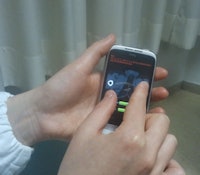 DICOM viewer at the Santa-Chiara Hospital, Pisa, running on a standard Android smartphone.
DICOM viewer at the Santa-Chiara Hospital, Pisa, running on a standard Android smartphone.
"We want to know how such lesions can they be seen on the latest iPad versus the conventional workstation. Results will be presented at a conference at the University of Udine, Italy 22 June," he said.
It is hoped that this year's CARS will more than match the success of previous meetings, particularly in terms of the continual improvement of the quality of presentations and papers, according to Caramella.
"Of more concern is the ongoing economic difficulties that threaten to hamper attendance," he added.
So far, there are 700 registered delegates, the largest group coming from Japan with 150 participants followed by the U.S. and Italy jointly, each with 90, and the rest so far made up of Germans (80), Canadians (40), French, Swiss, those from the U.K., and North Koreans (each at 30 registrants) and smaller totals from other countries. Caramella is open about the fact that he had hoped there would be a record attendance of around 1,000 delegates given the other attractions Pisa has to offer. With last year's congress population at 800 delegates, he is confident that this figure at least, can be reached over the next two months.
